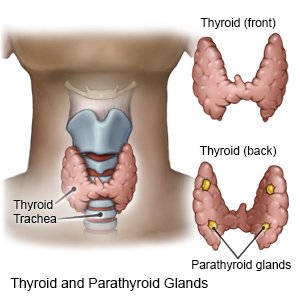Hyperthyroidism in Pregnancy
Medically reviewed by Drugs.com. Last updated on May 6, 2024.
What is hyperthyroidism?
Hyperthyroidism is a condition that develops when the thyroid gland makes too much thyroid hormone. Thyroid hormones help control body temperature, heart rate, growth, and weight.
 |
What causes hyperthyroidism?
- An autoimmune disease is an immune system problem that may make your thyroid gland produce too much thyroid hormone. Graves disease is an example of an autoimmune disease that increases thyroid hormone.
- A family history of thyroid disease or autoimmune disease can also increase your risk.
- Certain medicines , such as heart medicines used to help you heart beat normally, can cause hyperthyroidism.
- Infections near the thyroid gland may damage the gland.
- Other thyroid problems such as an enlarged or swollen thyroid, lumps caused by infections, or thyroid cancer can affect how your thyroid works.
- High iodine levels can cause hyperthyroidism. The thyroid gland uses iodine to create thyroid hormone. The thyroid can produce too much hormone if your iodine levels are high.
What are the signs and symptoms of hyperthyroidism during pregnancy?
The signs and symptoms of hyperthyroidism may start slowly, and you may not notice changes right away.
- Weight loss or not gaining weight as expected, increased appetite, diarrhea, or constipation
- Fast heart rate and fast breathing, even at rest
- Increased sweating, and heat intolerance
- Painful lump in your neck or bulging eyes
- Nervousness, restlessness, fatigue, or difficulty sleeping
- Tremors and muscle weakness
- Increased blood pressure, with headache, nausea, and blurred vision
What is a thyroid storm?
Thyroid storm happens if your thyroid hormone levels get too high. Your temperature may go very high, your heart may beat very fast, and you may have problems thinking. You may have increased sweating, vomiting, or diarrhea. You may have seizures or go into a coma, which can be life-threatening if you do not get medical care quickly. Thyroid storm may happen if you have hyperthyroidism and get an infection or stop taking your thyroid medicine. Injuries, burns, and certain medicines can also cause a thyroid storm.
How is hyperthyroidism during pregnancy diagnosed?
Your healthcare provider will ask about your symptoms and the medicines you take. He or she will ask about your medical history and if anyone in your family has thyroid disease. You will have blood tests to check your thyroid hormone level.
How is hyperthyroidism during pregnancy treated?
Treatment for hyperthyroidism during pregnancy will depend on your health, age, stage of pregnancy and the size of your thyroid gland.
- Antithyroid medicines decrease thyroid hormone levels. They may be used during your pregnancy.
- Surgery may be done to remove all or part of your thyroid gland. Your healthcare provider may do surgery during your pregnancy if he or she feels that it will be safe for you and your baby.
Treatment options
The following list of medications are related to or used in the treatment of this condition.
When should I call my doctor?
- Your baby is moving less than usual.
- You have a fever.
- You feel nervous and restless.
- You have chills, a cough, or feel weak and achy.
- You run out of thyroid medicine or have stopped taking it.
- You have questions or concerns about your condition or care.
When should I seek immediate care or call my local emergency number (911 in the US)?
- Your baby is restless and always kicking, or is not moving at all.
- You have sudden chest pain or trouble breathing.
- Your water broke, or you are bleeding from your vagina.
- Your heart is beating very fast.
- You faint or have a seizure.
Care Agreement
You have the right to help plan your care. Learn about your health condition and how it may be treated. Discuss treatment options with your healthcare providers to decide what care you want to receive. You always have the right to refuse treatment. The above information is an educational aid only. It is not intended as medical advice for individual conditions or treatments. Talk to your doctor, nurse or pharmacist before following any medical regimen to see if it is safe and effective for you.© Copyright Merative 2024 Information is for End User's use only and may not be sold, redistributed or otherwise used for commercial purposes.
Learn more about Hyperthyroidism
Treatment options
Care guides
Symptoms and treatments
Medicine.com guides (external)
Further information
Always consult your healthcare provider to ensure the information displayed on this page applies to your personal circumstances.
